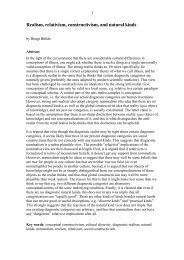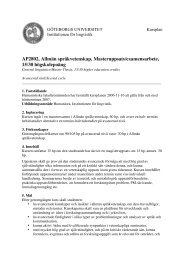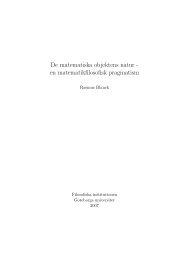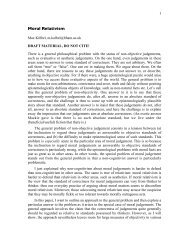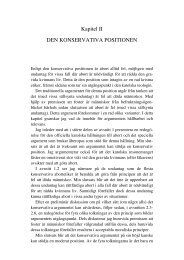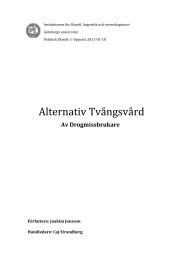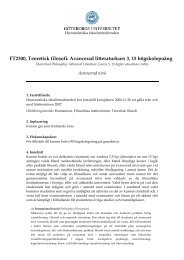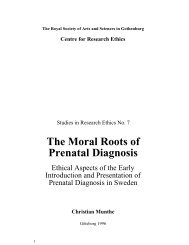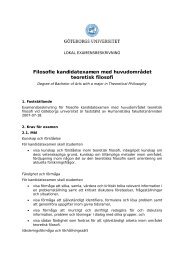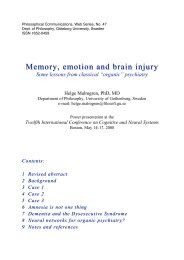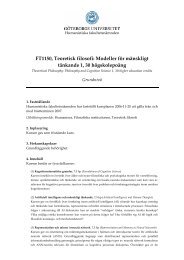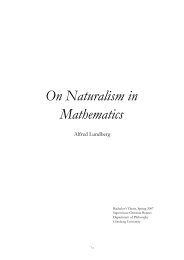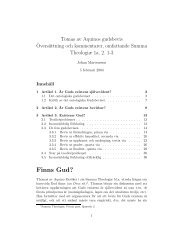Free will, determinism and suicide
Free will, determinism and suicide
Free will, determinism and suicide
Create successful ePaper yourself
Turn your PDF publications into a flip-book with our unique Google optimized e-Paper software.
Philosophical Communications, Web Series, No 36<br />
Dept. of Philosophy, Göteborg University, Sweden<br />
ISSN 1652-0459<br />
<strong>Free</strong> <strong>will</strong>, <strong>determinism</strong> <strong>and</strong> <strong>suicide</strong><br />
Frank Lorentzon<br />
e-mail: frank@filosofi.gu.se<br />
The problem of free <strong>will</strong> has occupied the minds of men at least since antiquity. Traditionally,<br />
the question doesn’t concern whether we feel free or not when acting or deciding what to do,<br />
but whether we are free or not. It’s not, stated as an ontological question, primarily a query of<br />
how free we are, but if we are free at all. Since the 17 th century, the problem has been<br />
formulated as the question whether there can be any free <strong>will</strong> if <strong>determinism</strong> is true.<br />
Determinism can be defined in many ways. I <strong>will</strong> stick to this, rather crude, definition:<br />
<strong>determinism</strong> is the hypothesis that everything that happens is caused by prior states in the<br />
world. The fundamental point here is that everything that happens is taken to be sufficiently<br />
determined by prior states, hence there could never have been any real alternatives to what<br />
actually happened. Whether <strong>determinism</strong> is true or not is still an open issue; we are not, at the<br />
present stage of science, able to give a definitive answer.<br />
To summarize the most common types of answers to the question of free <strong>will</strong>, we can<br />
distinguish between three main types of answers:<br />
Compatibilism defines freedom as the power to act according to one’s <strong>will</strong>, not being<br />
constrained by external or internal pressure to a degree that makes the action compelled. You<br />
are free if you did what you did because you wanted to, <strong>and</strong> not for other reasons. It’s a<br />
widely held position in the current debate, but this solution does not actually state that our <strong>will</strong><br />
is free: the <strong>will</strong> is caused by our character, our memories <strong>and</strong> our mood as well as by our<br />
perception of the situation in which we act. Our <strong>will</strong>, like everything else, is an integral part of<br />
an all-encompassing causal web, <strong>and</strong> even though we did what we did because we wanted to,<br />
we could not have wanted what we didn't want. Hence, freedom (but not free <strong>will</strong>) is possible<br />
even if <strong>determinism</strong> is true according to the compatibilist.<br />
Others disagree with this solution. Traditionally free <strong>will</strong> has often been regarded as<br />
excluded by <strong>determinism</strong>; if <strong>determinism</strong> is true there never are any alternatives, hence there<br />
cannot be any free <strong>will</strong>, since free <strong>will</strong> presupposes real alternatives. Both libertarianism <strong>and</strong><br />
fatalism dem<strong>and</strong>s that we, to be free, must have been able to have wanted what we didn’t<br />
want, in order that we could have done what we didn’t do. Libertarianists believe we have this<br />
sort of freedom, fatalists don’t.<br />
So, which answer to the question is the correct one? Well, all the traditional answers have<br />
their weaknesses:<br />
Compatibilism seems to leave out an important intuition we actually have concerning our<br />
freedom; that we are free only if we could have acted other than we did.<br />
Libertarianism gives credit to this intuition, but fails to explain this autonomous <strong>will</strong>. The<br />
<strong>will</strong> is said to be undetermined, but can’t of course be r<strong>and</strong>om since if an act was the result of<br />
© Frank Lorentzon 1 ICCP 2005
chance it wasn’t under the agents control any more than if it were determined: it must<br />
therefore be caused by the agent, but nothing must cause the agent to produce this <strong>will</strong> instead<br />
of another one – it’s an uncaused cause. Labelling this as self-determination just puts a name<br />
on the mystery, but doesn’t solve it.<br />
Fatalism, finally, states that free <strong>will</strong> is a convincing illusion, resulting from our limited<br />
ability to see what causes us to want what we want <strong>and</strong> do what we do. Sometimes we feel<br />
free, sometimes we don’t, but in neither case we could have done anything other than we did<br />
since <strong>determinism</strong> is held to be true. But the cost for this answer is high; we lose our<br />
traditional justification for moral blame <strong>and</strong> moral praise, since no one is held responsible for<br />
what he couldn’t have avoided doing.<br />
But instead of continuing with this age-old quarrel, I want to take one step back, <strong>and</strong> ask<br />
whether there might be a more fruitful way to h<strong>and</strong>le the question of free <strong>will</strong>. And there is, I<br />
believe, a roundabout way to do so. So, in order to get there, let us turn to another problem for<br />
a moment: the problem of <strong>suicide</strong>.<br />
II<br />
Albert Camus once said, in The Myth of Sisyphus, that there is only one really serious<br />
philosophical problem: <strong>suicide</strong>. When one decides whether life is worth living or not, one<br />
answers the fundamental question of philosophy. For Camus our existence is held to be<br />
absurd, but he advocates an attitude of revolt against this absurdity; to live as if life has<br />
meaning, even though it, objectively, is utterly meaningless – a state of affairs we shouldn’t<br />
try to hide with ideology or philosophy. So, on the final count, Camus rejects <strong>suicide</strong>: life is<br />
worth living.<br />
It might seem that Camus’ statement is far too intellectual in its approach to <strong>suicide</strong>; a<br />
person considering or actually trying to commit <strong>suicide</strong> usually does so out of despair, not as<br />
a result of reflection on whether life is worth living or not. This desperation can be a result of<br />
psychiatric disorder, drug abuse or a life crisis, <strong>and</strong> the circumstances are characterised by<br />
chaos rather than rationality. The person can no longer cope with his situation – he has lost his<br />
felt ability for control. Life has come to a point were it is unbearable.<br />
But to die is not just a way to flee despair. Considering (or even trying to commit) <strong>suicide</strong><br />
can, perhaps paradoxically, be understood as an effort to regain lost control: the person<br />
cannot bring his life in order, but he can, at least, bring it to an end. He doesn’t see any way<br />
out of his anguish; all roads seem closed, <strong>and</strong> the only real alternative to his unbearable<br />
suffering is to end his life. I’ve been told by people, who have lived with <strong>suicide</strong> as a very<br />
tangible option in their lives, that the thought of ending it all made life just a little bit more<br />
bearable. There were always this cliff, these pills, this knife – if the anguish became too great<br />
to live with. This situation – to live with despair or to end it all – constituted a choice, <strong>and</strong><br />
affirmed an autonomy which prior to this seemed nonexistent. It helped them to make it<br />
trough the days, one by one, until they found life bearable, worth living again.<br />
This actually confirms Camus’ point; <strong>suicide</strong> constitutes a choice of whether life is<br />
worth living or not – but we have to notice that when I’m deciding whether my life is worth<br />
living for me, the choice isn’t an intellectual choice, but rather an existential one.<br />
Kierkegaard might be of some help in making the point clear. In his reasoning on the dialectic<br />
of paradox, he notices that for some phenomena, e.g. fidelity <strong>and</strong> faith, genuine affirmation by<br />
necessity includes affirmation of their opposites as well, but includes these as excluded<br />
possibilities. E.g. to be faithful entails that you affirm the possibility of infidelity, but include<br />
© Frank Lorentzon 2 ICCP 2005
this as an annulled possibility. And, he says, faith entails the possibility of both the spiritual<br />
<strong>and</strong> the demonic, but the latter is included as a real but rejected possibility. To summarise, the<br />
logic of paradox states that sometimes, to affirm something, (X), you have to affirm the<br />
possibility of its negation, (¬X), but as an excluded possibility; it’s a real possibility, but one<br />
that is rejected. But as excluded it isn’t ruled once <strong>and</strong> for all; it remains present, but present<br />
as absent.<br />
I think this line of reasoning applies to what’s happening when a person is considering<br />
<strong>suicide</strong>. When living in severe despair, this actualises the existential question whether life is<br />
worth living or not. But affirming life entails considering its alternative, death, as a very real<br />
possibility; only in contrast to its annihilation one can evaluate the value of one’s life.<br />
III<br />
To return to the problem of free <strong>will</strong>, I think the approach to <strong>suicide</strong> I just gave can be applied<br />
here as well. The question about free <strong>will</strong> is also, I think, ultimately a question about control.<br />
We all know that there is a felt difference between what’s up to us, <strong>and</strong> what isn’t. The<br />
freedom we experience comes in degrees: some things, but not others, are felt to be up to us to<br />
a higher or lesser degree. The question is not if I, when <strong>will</strong>ing, deciding or acting, am part of<br />
a causal web or not, but whether my actions are mine – under my control – or not. Maybe we,<br />
when thinking about free <strong>will</strong>, should refrain from immediately starting to analyse this<br />
“mineness” in terms of <strong>determinism</strong>, chance or self-determination; the main thrust of my<br />
comparison with contemplating <strong>suicide</strong> is that the question primarily is of an existential<br />
nature.<br />
We can set our freedom in question in a variety of specific cases. And we can, in a sense,<br />
question our very ability to act as well, something we might feel inclined to do especially<br />
when we feel a substantial lack of control over our lives. In part we define ourselves in<br />
relation to what we are not. It just might be the case that to affirm our freedom we must<br />
entertain the idea that it is possible that we utterly <strong>and</strong> in every situation lack control – that we<br />
lack free <strong>will</strong>. It is a possibility that, for most of us, only can be accepted as excluded, but the<br />
very act of considering this possibility is what reaffirms our freedom in our own eyes.<br />
If this is the case it suggests why the problem of free <strong>will</strong> continues to be of interest.<br />
Some questions have an existential, not only an intellectual, dimension. The question about<br />
our freedom is, in the end, a question about how to relate to our own agency <strong>and</strong> to our<br />
responsibility for what we are doing. Others might present the ground for our reasoning, but<br />
they can’t answer the question in our place. That, only we can do on our own. 1<br />
1 This paper was read at the International Congress of Cognitive Psychotherapy (ICCP) in Gothenburg 2005.<br />
For further discussions on the problem of free <strong>will</strong>, see Lorentzon, Frank: Fri vilja? (Acta Universitatis<br />
Gothoburgensis, Göteborg, 2002). The Myth of Sisyphus was originally published in 1943 (Camus, Albert: Le<br />
Mythe de Sisyphe, Gallimard, Paris). For some basic facts about <strong>suicide</strong> Nationalencyklopedin was consulted<br />
(Bra böcker, Höganäs, 1989-99). For a thorough discussion on Kierkegaard’s Dialectic of Paradox see Hall,<br />
Ronald L: The Human Embrace (The Pensylvania State University Press, University Park, Pensylvania, 2000).<br />
© Frank Lorentzon 3 ICCP 2005



